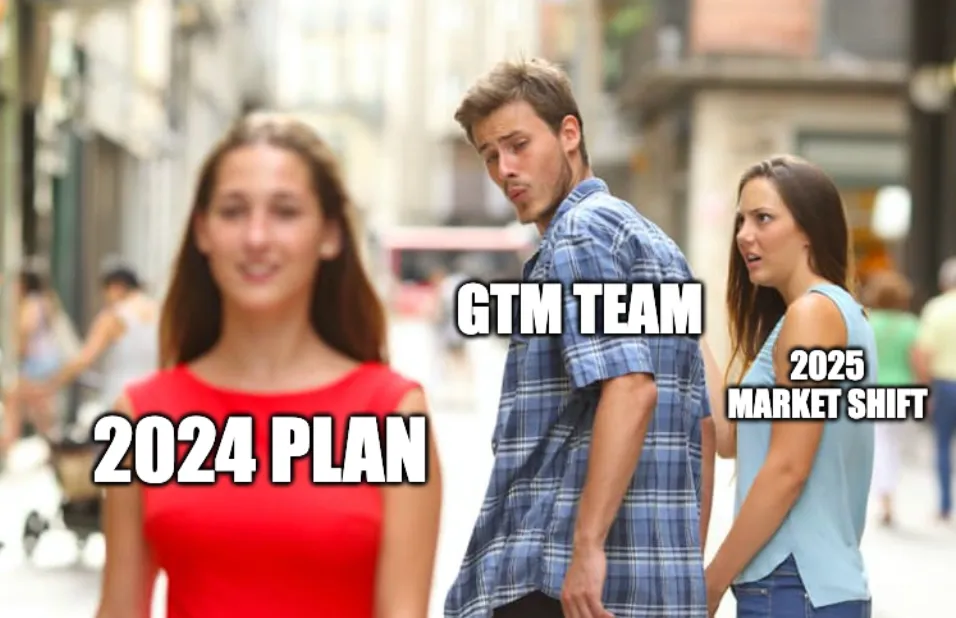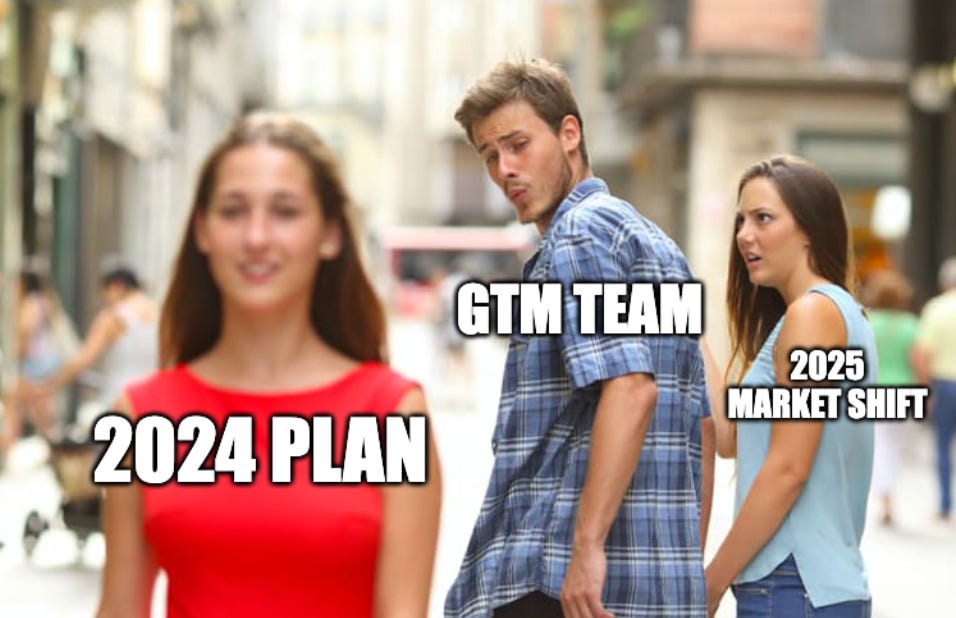GTM Alpha
GTM Alpha is the new frontier of go-to-market execution—one defined not by playbook adherence, but by experimental velocity, signal discovery, and engineered advantage. This post unpacks why traditional sales strategies are decaying faster than ever, what defines a high-alpha team, and how the most agile GTM orgs build, run, and discard new tactics before the rest even catch on.

Let's cut the intro fluff: the go-to-market playbook is broken.
What used to be a reliable engine—hire more reps, plug them into Outreach, give them a persona sheet and a sequence—is now the equivalent of showing up to a Formula 1 race in a Honda Civic with a spoiler. GTM Alpha is what separates the teams barely surviving from the ones consistently outperforming. Not because they work harder. Because they learn faster, ship experiments quicker, and treat go-to-market like a compounding product, not a repeatable checklist.
And yes, that sentence will upset someone in revenue operations. Probably already has.
Conventional GTM Is Now a Beta Strategy
The average outbound email reply rate is dropping faster than your CMO's LinkedIn engagement. The average SDR is spending more time updating CRM fields than talking to humans. The average "proven playbook" is a year old and cribbed from someone else's RevGenius post.
The shelf life of GTM tactics? Shrinking. Rapidly.The average outbound email reply rate is dropping faster than your CMO's LinkedIn engagement. The average SDR is spending more time updating CRM fields than talking to humans. The average "proven playbook" is a year old and cribbed from someone else's RevGenius post.
The shelf life of GTM tactics? Shrinking. Rapidly.

Everett Berry (Clay) put it cleanly: "Go-to-market tactics have always stopped working over time. What's different now is that their shelf life is so much shorter." That brilliant email you tested? Expect it to get saturated within 2 weeks if it works. That clever new data signal? Assume every SDR scraping LinkedIn has caught on by next quarter.
The traditional sales org is optimized for efficiency of execution. But what happens when execution alone isn't enough? When everyone executes the same way? Alpha vanishes.
You don't win by being more efficient at the same thing. You win by doing different things before they become the same.
So What Is GTM Alpha?
Borrowed from finance, alpha means outperformance—returns beyond the benchmark. In GTM, it's the same idea: consistently beating the market using information, timing, and tactics others haven't discovered yet.
But there's a twist: it doesn't last.
Alpha gets arbitraged away. As soon as your new play hits a sales subreddit, it's dead. Everyone floods in. The response rate drops. The signal decays. We move on.
This is what makes GTM Alpha so painful and so powerful. You can't store it. You can't template it. You can only build a system that discovers it repeatedly.
Or, put another way: there is no permanent GTM advantage, only the compounding value of being the first to figure it out.
High-Alpha Teams Play a Different Game
Let's break it down. GTM Alpha teams aren't doing the same thing as everyone else but faster. They're running an entirely different loop:
1. They Find Proprietary Signals. Not "enriched firmographics" – actual triggers. Like "just hired a head of compliance in a regulated market." Or "coffee chains with $25+ entrees that opened two new locations near B2B gyms."
These signals live in weird places: subdomains, obscure JSON fields, product usage patterns, Yelp reviews. The trick isn't scraping harder. It's asking weirder questions.
2. They build custom tools. Off-the-shelf SaaS isn't enough. Clay, Retool, internal LLM agents, Frankenstein Airtable+Zapier+Postgres monstrosities—whatever works.
Why? Because once the signal is found, they want to operationalize it before it decays. Alpha is perishable.
3. They hire GTM Engineers. Not sales engineers. Not sales ops. Not revops. GTM engineers. A scrappy, technical operator embedded inside the GTM org whose job is to build new workflows, run experiments, and ship daily.
Think "sales devs" instead of "sales reps."
4. They obsess over test velocity. Most teams plan their experiments quarterly. GTM Alpha teams run microtests weekly. New hook, new offer, new sequence, new enrichment logic. 20 tests a quarter instead of 2. Most will fail. But a few will generate 10x results for 2 months. That's alpha. Then they do it again.
5. They accept that it all dies. No attachment. No sacred cows. The best tactic of Q2 will be irrelevant in Q3. The win rate will drop. The novelty will fade. And then they'll try something new.
GTM Alpha is less about cleverness and more about willingness to let go.
What This Feels Like Inside a Real Org
The surface view: growth is consistent. Meetings are up. CAC is trending favorably. Everyone claps in the Monday standup.
The internal reality:
- Your AE found a new signal in Gong.
- A GTM engineer built a scraping workflow to operationalize it.
- Marketing launched a test campaign against the pattern.
- A week later, Sales has booked 12 meetings off of it.
- Ops is already thinking about how to automate the trigger into the CRM.
None of that happened because someone followed the playbook. It happened because the org is built to invent playbooks continuously.
This is the new shape of go-to-market: not static teams executing proven tactics, but dynamic pods creating and retiring tactics as fast as the market allows.
What It Takes to Get There
This isn't just a tech stack upgrade. It's a mindset upgrade.
- You need to treat go-to-market as a product. What does onboarding look like for reps? Where do signals come from? Where are the bottlenecks? You wouldn't ship your core product without an engineer, so why run GTM that way?
- You need to fund GTM R&D. Not "we'll try new things when Q3 slows down." A headcount. A budget. An expectation. GTM Alpha is a muscle, and most teams are skipping leg day.
- You need to reward people for trying weird sh*t. Especially when it doesn't work. Because if you're not running bad tests, you're not running enough tests.
- You need executive courage. The courage to kill what's "sort of" working. The courage to back an experiment with no precedent. The courage to explain to the board why last quarter's top channel got shut off.
The Inevitable Future
Here's the part where I sound insane.
In 12–24 months, most GTM teams will:
- Have LLM agents that identify signals and launch campaigns
- Run outbound without ever writing a sequence manually
- Deploy experiments daily across 10–15 micro-audiences
- Have a GTM engineer embedded in every team of 5–7 sellers
And the high-alpha teams? They'll be onto the next edge. Maybe real-time buyer modeling based on Zoom tone-of-voice sentiment. Maybe personalized microsites spun up mid-demo. Maybe B2B TikTok DMs in Sanskrit.
The point is: this doesn't stabilize. It speeds up. The advantage becomes less about any one tactic, and more about how fast your team can generate, test, and kill tactics.

Final Word: Alpha or Average
If you remember nothing else:
Playbooks don't win. Velocity does.
The best GTM teams don't sit around waiting for the next proven tactic. They build systems that find the next edge before others even know to look.
Alpha doesn't come from luck. It comes from structure, speed, and the willingness to run at the edge of chaos while everyone else is polishing PDFs.
So next time you feel that instinct to "optimize what we have," stop. Ask instead: What's the next temporary advantage we can invent before it expires?
Now go build that.
And when it works? Run it fast.
Because it's going to die.
(And that's how you know it was alpha.)
